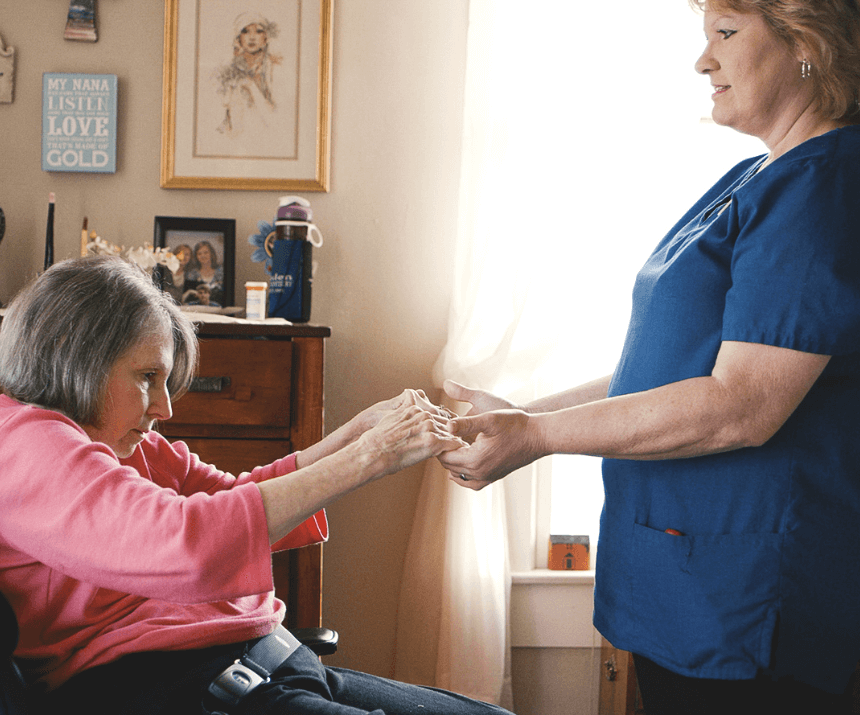Alzheimer’s and Dementia Care In Cincinnati
Professional In-Home Alzheimer’s and Dementia Care
The challenges of caring for a loved one who’s suffering from dementia can be overwhelming. Our professional caregivers can ease the burden with customized home health care services that ensure a higher quality of life for you, your loved one, and your entire family.
To provide the most effective method of home care services for your family’s unique situation, Home Helpers dementia caregivers receive specialized training and are highly experienced in dementia care; in fact, many are certified in Alzheimer’s care through our partnership with the National Certification Board for Alzheimer Care (NCBAC).
Schedule a free care assessment online or call (513) 712-0736 to get started with professional in-home memory care services near you.
Benefits Of In-Home Memory Care
At Home Helpers Home Care of Cincinnati and NKY, our in-home care services for Alzheimer's and dementia provide numerous benefits for both the individual living with dementia and their family caregivers.
- Our highly-rated caregivers help establish daily routines to promote independence and autonomy.
- Our caregivers also assist with daily activities and provide physical and emotion support.
- For family members, it provides additional support and assistance in managing the complex needs of a loved one.
- In-home care services are tailored to the specific needs of every individual.
- It allows your loved one to live comfortably at home with reduced confusion in familiar surroundings.
All of this leads to a significant uplift in the quality of life for everyone involved. In-home memory care offers families peace of mind knowing their loved one is being monitored and provided with the best possible level of care. Our services are available to clients in Cincinnati and surrounding communities!
Dementia Care Tips for Caregivers
Taking care of a loved one with dementia can be stressful, especially early on.
Here are some practical tips to help you provide the best care possible:
- Establish a daily routine for activities like bathing and eating to provide structure and familiarity.
- Use calendars and to-do lists to keep track of tasks and appointments, helping you and your loved one stay organized.
- Set up medication reminders to ensure they are taken regularly and on time.
- Consider using medical and mobility devices like shower chairs to assist with daily tasks and improve safety.
- Plan enjoyable activities that cater to your loved one's interests and abilities, providing mental stimulation and a sense of accomplishment.
- Choose clothing that is comfortable and easy to put on and take off, such as loose-fitting clothes with elastic waistbands.
- Serve meals consistently each day to help maintain a regular eating schedule.
- Be patient and respectful when interacting with your loved one, explaining each step of the process and allowing them time to comprehend and respond.
Personalized Dementia Care in Cincinnati
At Home Helpers Home Care of Cincinnati and NKY, we understand the importance of personalized care for individuals with dementia. We devise tailored care plans that focus on creating a familiar and secure environment for your loved one.
Our caregivers use personalized approaches, incorporating music, photographs, and favorite activities to enhance your loved one's quality of life. Our specialized dementia care services are available in Cincinnati and surrounding areas.
We are dedicated to providing excellent care for your loved ones. You can have peace of mind knowing that they are in safe hands. Get in touch with us today to know more about our specialized dementia care services and schedule a consultation with one of our caregivers.
If you need help with a loved one with Alzheimer’s and Dementia in Cincinnati, OH, please call us at (513) 712-0736 and schedule your free in-home care assessment today!
Frequently Asked Questions about Alzheimer's and Dementia
What is the difference between dementia and Alzheimer's disease?
Dementia is a general term used to describe a decline in cognitive abilities, including memory loss, thinking skills, and problem-solving abilities. Alzheimer's disease is a specific type of dementia and the most common cause of it. While all individuals with Alzheimer's have dementia, not everyone with dementia has Alzheimer's. Other types of dementia include vascular dementia, Lewy body dementia, and frontotemporal dementia.
What are the early signs and symptoms of dementia and Alzheimer's disease?
The early signs and symptoms of dementia and Alzheimer's can vary, but some common indicators include memory loss, difficulty finding words, challenges with problem-solving or completing familiar tasks, confusion about time or place, changes in mood or behavior, and withdrawal from social activities. It's important to note that experiencing occasional memory lapses or forgetting names does not necessarily indicate dementia, but if these symptoms become persistent and interfere with daily life, it's advisable to seek medical evaluation.
Can dementia and Alzheimer's disease be prevented?
While there is no guaranteed way to prevent dementia or Alzheimer's disease, certain lifestyle choices may help reduce the risk or delay the onset. These include maintaining a healthy diet, engaging in regular physical exercise, staying mentally and socially active, managing chronic conditions like diabetes and hypertension, avoiding smoking, and maintaining a healthy weight. It's also crucial to prioritize heart health, as there is a link between cardiovascular health and brain health.
What treatment options are available for dementia and Alzheimer's disease?
Currently, there is no cure for dementia or Alzheimer's disease. However, dementia care and Alzheimer's care focuses on managing symptoms, slowing down the progression, and improving the individual's quality of life. Treatment plans may include medications to manage cognitive symptoms and behavioral changes, as well as non-pharmacological interventions such as memory care, cognitive stimulation activities, physical exercise programs, and caregiver support. It's important for individuals diagnosed with dementia or Alzheimer's to work closely with healthcare professionals to develop a personalized treatment plan.

